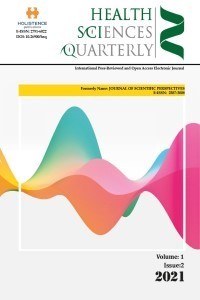Ethical View of Telemedicine Practices
Telemedicine—the utilization of clinical data and innovation to progress distanced clinical care can change the patient-centered approach. Telemedicine can coordinate distance monitoring and diagnostic instruments with computerized cooperation and suggestions to better interact with patients when they are not in a hospital. Despite these preferences, there is still some doubt as to how telemedicine applications may affect care. Guaranteeing that telemedicine is ethically admissible requires projection and consideration of four potential issues: the disruption of the patient-physician relationship, jeopardizing patient privacy, impelling one-size-fits-all applications, and the impulse to expect that innovation should be efficient
Keywords:
Telemedicine, Ethical View, Telemedicine Practices,
___
- https://www.wma.net/policies-post/wma-statement-on-the-ethics-of-telemedicine/ Accessed 12.01.2021
- Pew Research Internet Project. Health fact sheet. http://www.pewinternet.org/fact-sheets/health-fact-sheet/ Accessed 04.09.2014
- Yarnall, K.S., Pollak, K.I., Ostbye, T., Krause, KM., Michener, JL., 2003, Primary care: is there enough time for prevention? Am J Public Health, 93(4): 635-641.
- Ekeland, A.G., Bowes, A., Flottorp, S., 2010, Effectiveness of telemedicine: a systematic review of reviews. Int J Medical Informatics, 79(11):736-771.
- Başlangıç: 2017
- Yayıncı: Holistence Publications
Sayıdaki Diğer Makaleler
Şule GÖKYILDIZ SÜRÜCÜ, Dilek BİLGİÇ, Gülseren DAĞLAR, Semiha AYDIN ÖZKAN, Zekiye TURAN, Handan GÜLER, Hülya DEMİRCİ, Sultan ALAN, Sema DERELİ YILMAZ, Ayten DİNÇ, Eylem TOKER, Hüsniye DİNÇ, Tuba UÇAR, Saadet Gonca MAVİ AYDOĞDU, Zekiye KARAÇAM, Selda YÖRÜK, Figen DIĞIN, Gözde GÖKÇE İŞBİR, Hasan Hüseyi
Sevim BAYSAK, Ebru KARAGÜN, Havva Hilal AYVAZ
Abdülkadir BİLİR, Tolga ERTEKİN, Ozan TURAMANLAR, Hilal GÜZEL, Emre ATAY
Mehtap PEKESEN, Elif KOCAKAPLAN, Mehtap KACAR, Elif VATANOGLU
